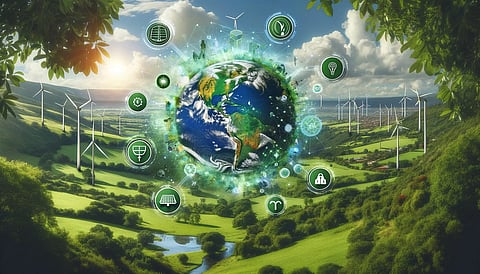
- Home
- Live Blog
- Breaking News
- Top Headlines
- Cities
- NE News
- Sentinel Media
- Sports
- Education
- Jobs

Satyabrat Borah
(satyabratborah12@gmail.com)
As the whole world is desperately searching for some way to combat climate change and resource consumption, sustainable technology is emerging as a foundation for building a greener, more flexible future. Sustainable technology refers to innovations designed to reduce environmental impact, conserve resources, and encourage long-term ecological balance. These technologies address pressing challenges such as carbon emissions, energy efficiency, and waste management, ensuring that economic growth is in harmony with environmental preservation.
The global reliance on technology has led to increased energy demands and resource consumption. Sustainable technologies aim to mitigate these issues by reducing the ecological footprint of operations across industries. By implementing these innovations, businesses can decrease greenhouse gas emissions, minimise waste, and enhance their overall energy efficiency. This approach not only helps the planet but also generates significant cost savings for organisations in the long run. Sustainable technology plays a crucial role in achieving global climate goals. As countries push toward net-zero emissions, integrating technologies that promote energy efficiency and reduce pollution will be pivotal in slowing down the impact of global warming.
A critical component of sustainable technology is the shift from fossil fuels to renewable energy sources such as wind, solar, and hydropower. These sources not only reduce dependence on carbon-intensive fuels but also help countries and industries meet emission reduction targets. Solar energy has seen significant advancements in photovoltaic cells, making it more affordable and scalable for both businesses and households. Innovations like smart grids are revolutionising the way electricity is distributed and consumed. These grids allow for better management of energy demand, which reduces waste and ensures efficient distribution of electricity from renewable sources.
Data centres are becoming significant contributors to global energy consumption. Companies are also adopting green computing practices that prioritise energy-efficient hardware, software optimisation, and sustainable cooling solutions.
Data centres are increasingly powered by renewable energy sources by reducing their carbon footprint. Companies such as Google and Amazon Web Services have committed to running their data centres on 100% renewable energy and also implemented AI-driven cooling systems to minimise energy use. The linear economy model of “take, make, and dispose” is replaced by a more sustainable circular economy framework. This approach prioritised reusing, repairing, and recycling products and materials, particularly in the technology sector, where e-waste is a growing concern.
Tech giants are now adopting sustainable manufacturing practices by designing products that are easier to recycle and reuse. Companies are also offering buy-back and recycling programs for old devices. Companies are trying to reduce e-waste and ensure valuable materials are recovered and repurposed.
Technology is playing a transformative role in making agriculture more sustainable. Precision farming technologies, such as drones and IoT sensors, enable farmers to optimise water usage, reduce pesticide application, and improve crop yields. Vertical farming and lab-grown meat are reducing the need for arable land and decreasing methane emissions from livestock farming.
These innovations are essential for addressing the challenges of feeding a growing global population and minimising environmental damage from traditional agricultural practices.
Cities around the world are integrating sustainable technologies to reduce their carbon footprints and improve the quality of life for their residents. Smart cities use technologies such as IoT-enabled street lighting, electric vehicle infrastructure, and energy-efficient buildings in order to reduce energy consumption and emissions. Green architecture emphasises materials that are environmentally friendly, such as recycled steel, bamboo, and low-impact concrete, in building design. Innovations in insulation, heating, and cooling systems also help to minimise energy use in both residential and commercial properties.
Sustainable technology is not just an environmental imperative; it is also a key driver of economic growth. Adopting green technologies can lead to reduced operating costs, especially in energy-intensive sectors like manufacturing and transportation. Companies that embrace sustainability are increasingly seen as attractive to consumers, investors, and employees who prioritise environmental responsibility. Studies show that businesses with strong sustainability initiatives often outperform their peers in terms of financial returns. For instance, the Gartner 2024 report highlights that by 2027, 80% of CIOs will have performance metrics tied to the sustainability of their IT operations, underscoring how central sustainability is becoming to business successes.
Though the adoption of sustainable technology is growing, there are still challenges to overcome. High upfront costs, lack of infrastructure, and policy barriers can impede the widespread implementation of green technologies. But as of now, governments, corporations, and consumers increasingly recognise the need for sustainability; the demand for supportive policies, investments in research and development, and educational initiatives will continue to grow. Sustainable technology is more than a trend. It is a necessity for a future that balances economic growth with environmental preservation. If we will continue to innovate in areas such as renewable energy, smart infrastructure, and resource efficiency, we can build a world that not only thrives today but also secures the well-being of future generations.